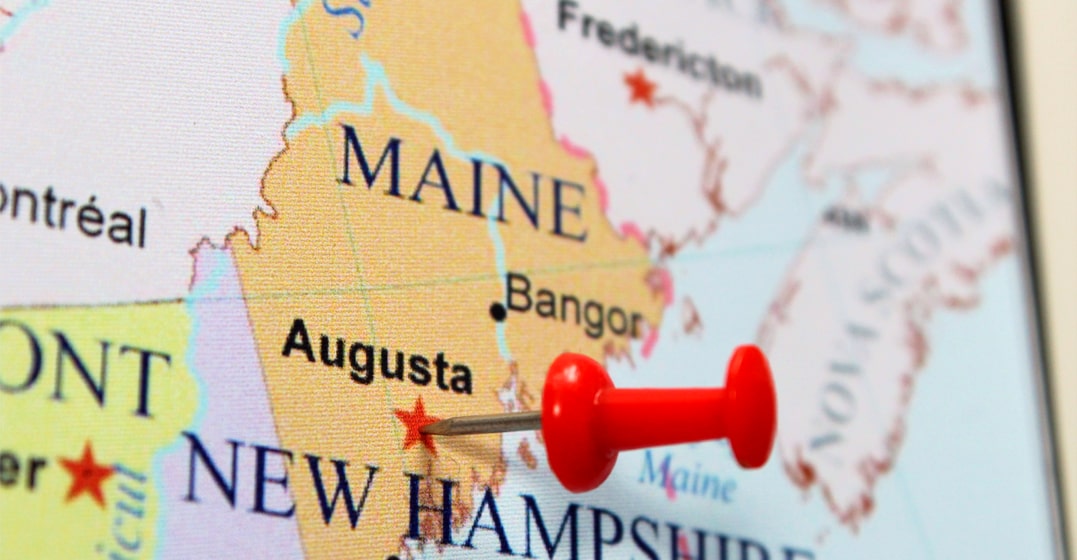Updated on February 12, 2024

Maine Lobster and the Maine Accent

Next on our American accents tour, we’re stopping by for some lobsters in the state of Maine.
Maine is famous for its delicious lobster (say /lahb sta/) and countryside beauty. It’s also famous for a unique accent that is hard to replicate.
While the Maine accent has some commonalities with other New England accents, there are unique expressions and pronunciations. In this article, we’ll talk about the origins of the Maine accent and what makes it different.
The Maine accent is a result of historical, cultural and social currents. Maine is located at the very northeastern point of the United States.
On the New England accent map, it is closely related to the eastern New Hampshire and Massachusetts accents. It is bordered by Canada to the north, the Atlantic Ocean to the south and New Hampshire to the west. Maine is relatively geographically isolated from its New England neighbors. No doubt, this isolation allowed for the unique development of the Maine accent.
Like other New England states, the first European colonists in Maine were from England in the 17th century. They brought various British accents with them. The vowels started changing over the years to form the “yankee twang accent” as the New England accent was sometimes called. Areas of current-day Maine were once French territories until as recently as 1839. In the 20th century, immigrants from both Francophone Canada and Ireland moved to Maine.
Fishing is the primary economy of Maine. About 83% of household incomes are from fishing. The most famous product is lobster or in a Maine accent /lahb sta/.
Let’s take a look at some of the main features of the Maine accent.
Like other New England and Boston accents, Mainers will drop their R’s. In standard American pronunciation almost all R’s are pronounced, but not in Maine.
An “r” will be added as a linking sound between a word that ends in a vowel and the next word that begins in a vowel. This is known as an intrusive or linking “r.”
In the Maine accent the “or” sound is flattened out and the “r” removed. This will affect words like:
For words ending in vowel sounds, a Mainer will also make a diphthong where most Americans will have a simple vowel.
Given Main’s proximity to the Canadian border, it’s possible to hear some similar pronunciations in the Maine accent. “Canadian raising” changes a monophthong into a diphthong before an unvoiced vowel. In Maine, this can affect words like:
Another unique element that you’ll find in Maine is non-standard verb forms. While these Maine phrases are considered grammatically incorrect, they are often used.
| Verb | Maine Non-standard verb | Standard verb |
| Bring | Brung | Brought |
| Drown | Drownded | Drowned |
| Dream | Dremp | Dreamed |
| Grow | Growed | Grew |
| Hear | Heared | Heard |
| Ride | Rid | Rode |
The key to understanding and recreating a Maine accent is to listen to locals. You can listen to audio clips from various parts of Maine here. This is another local Mainer telling a long story.
Although neither has a strong Maine accent, actors Patrick Dempsey and Anna Kendrick are from Maine.
Here are some Maine slang words. Use these Maine phrases with the pronunciation to practice your Maine accent.
| Slang | Meaning | Example |
| Ayuh /eye yuh/ | yes | You workin? Ayuh, until late. |
| From away | Not from Maine | She’s from away. |
| Down cellar /down sellah/ | In the basement | Send the kids down cellar. |
| Cunning | cute | Wan’t that dog cunnin’? (wasn’t that dog cute?) |
| Gorry | gosh! | Gorry, you can’t get they-ya from heyah. (Gosh, I don’t want to give you directions) |
Maine’s unique geographical location and history allowed the Maine accent to develop uniquely from other New England counterparts. Sure, Maine drops their r’s, but there’s a lot of colorful language and vowels that make Maine different.
So the next time you’re visiting, try to say, “Ayuh, Maine is a dahn gut place fah lahbsta.” (Yup, Maine is a darn good place for lobster).